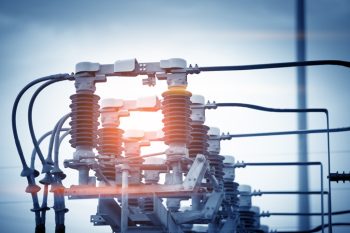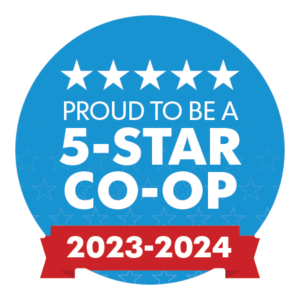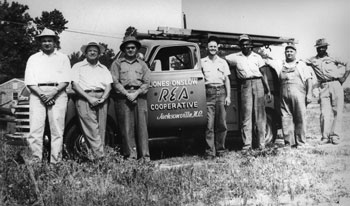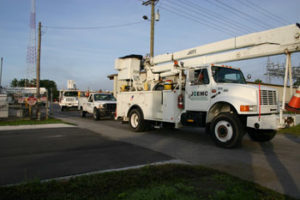TEMA is the material supply organization of the 26 electric cooperatives of North Carolina. TEMA was founded to serve as a combined cooperative effort in purchasing materials, equipment, and supplies at competitive prices. Open for business in January 1976, TEMA’s modern warehouse contains 112,000 square feet of storage space and contains inventory which includes protective equipment, transformers, meters and other materials used by the electric cooperatives.
About Us


Our Mission
About JOEMC
Jones-Onslow’s mission is to provide safe, reliable and affordable electric service with uncompromised excellence in customer service while committing to improve the quality of life for our members through community and civic involvement.
- Proudly serving residential, commercial, industrial, and agricultural accounts
- Improving the quality of life for our members
- Community and civic involvement.

Jane Doe
JOEMC CEO

Our Mission
About JOEMC
Jones-Onslow’s mission is to provide safe, reliable and affordable electric service with uncompromised excellence in customer service while committing to improve the quality of life for our members through community and civic involvement.
- Proudly serving residential, commercial, industrial, and agricultural accounts
- Improving the quality of life for our members
- Community and civic involvement.
Our Mission
Jones-Onslow’s mission is to provide safe, reliable and affordable electric service with uncompromised excellence in customer service while committing to improve the quality of life for our members through community and civic involvement.
The Cooperative Difference
Electric cooperatives, like Jones-Onslow EMC, are private, independent electric utilities, owned by the members they serve. As democratically governed businesses, electric cooperatives are organized under seven guiding principles, anchoring them firmly in the communities they serve and ensuring they are closely regulated by their consumers.
Voluntary and Open Membership
Cooperatives are voluntary organizations open to all persons able to use their services and willing to accept the responsibilities of membership, without gender, social, racial, political, or religious discrimination.
Democratic Member Control
Cooperatives are democratic organizations controlled by their members, who actively participate in setting policies and making decisions. The elected representatives are accountable to the membership. In primary cooperatives, members have equal voting rights (one member, one vote), and cooperatives at other levels are organized in a democratic manner.
Members’ Economic Participation
Members contribute equitably to, and democratically control, the capital of their cooperative. At least part of that capital is usually the common property of the cooperative. Members usually receive limited compensation, if any, on capital subscribed as a condition of membership. Members allocate surpluses for any or all of the following purposes: developing the cooperative, possibly setting up reserves, part of which at least would be indivisible; benefiting members in proportion to their transactions with the cooperative, and supporting other activities approved by the membership.
Autonomy and Independence
Cooperatives are autonomous, self-help organizations controlled by their members. If they enter into agreements with other organizations, including governments, or raise capital from external sources, they do so on terms that ensure democratic control by their members and maintain their cooperative autonomy.
Education, Training, and Information
Cooperatives provide education and training for their members, elected representatives, managers, and employees so they can contribute effectively to the development of their cooperatives. They inform the general public, particularly young people and opinion leaders, about the nature and benefits of cooperation.
Cooperation Among Cooperatives
Cooperatives serve their members most effectively and strengthen the cooperative movement by working together through local, national, regional, and international structures.
Concern for Community
While focusing on member needs, cooperatives work for the sustainable development of their communities through policies accepted by their members.
Most electric co-ops are distribution cooperatives that deliver electricity to the consumer. Some are generation and transmission cooperatives (G&Ts) that both generate and transmit electricity to meet the power needs of distribution cooperatives.
In addition to electric service, many electric co-ops are involved in community development and revitalization projects, e.g., small business development and job creation, improvement of water and sewer systems and assistance in the delivery of health care and educational services.
Co-ops Vote

Like all North Carolina electric cooperatives, Jones-Onslow EMC is based on the principle of democratic member control, meaning that all members served by the co-op have a vote and a voice in setting the co-op’s policies and strategic direction.
This commitment to democratic decision-making extends to the co-op’s efforts to reach out to members of Congress and the North Carolina General Assembly to make them aware of cooperative priorities and issues that affect co-op members and advocate for legislative changes that will positively impact our co-op and the diverse communities we serve.
Co-ops Vote is a non-partisan program designed to boost voter turnout in areas served by electric cooperatives across the country to ensure their member-owners voices are heard, and issues that concern them are prioritized every day, especially on Election Day. The program continues cooperatives’ commitment to raising awareness in rural communities.
In the 2012 national elections, voter turnout in rural communities dropped by 18 percent — twice that of the nation. Co-ops Vote was created to boost voter participation and represent rural Americans’ concerns at a national level. As your local electric
co-op, JOEMC has joined the fight with electric cooperatives across the country to make its members’ voices heard.
The non-partisan campaign does not endorse nor recommend candidates, rather, it educates member-owners on candidates’ stances on important co-op issues.
Affiliations
Jones-Onslow EMC has affiliations with several statewide , regional, and national organizations.
Jones-Onslow EMC is a member of Touchstone Energy, an alliance of local, consumer-owned electric cooperatives across the country committed to providing superior service to all customers, large and small. Touchstone Energy provides a brand with core values that consumers have long associated with cooperatives: integrity, accountability, innovation and a longstanding commitment to their communities. Touchstone Energy provides high standards of service to all customers (residential, commercial, industrial and agricultural) and…
- Is an alliance of more than 750 cooperatives in 46 states that collectively deliver power and energy solutions to more than 32 million members every day
- Provides high standards of service to all customers — residential, commercial, industrial and agricultural
- Is a branding initiative that communicates electric cooperatives’ unique characteristics in a changing marketplace where these values and differences matter more each day
- Emphasizes the significance of each electric cooperative’s local presence and unique ties to its community, but offers the resources of a nationwide network to bring added value and benefit to customers
NRECA is the national service organization dedicated to representing the national interests of the electric cooperatives and the consumers they serve. Founded in 1942, NRECA was organized specifically to overcome World War II shortages of electric construction materials, to obtain insurance coverage for newly constructed rural electric cooperatives and to mitigate wholesale power problems. NRECA’s more than 900 member cooperatives serve 42 million people in 47 states.
North Carolina’s Electric Cooperatives provide reliable, safe and affordable energy and related services to more than 950,000 households and businesses in 93 of the state’s 100 counties. Each of the 26 cooperatives is member-owned, not-for-profit and overseen by a board of directors elected by the membership.
NCAEC serves as the statewide associate for North Carolina’s 26 electric cooperatives, working to promote training, safety, and education among their consumers and the general public. NCAEC programs include government relations, Carolina Country magazine, training programs, and workshops for cooperative directors and staff, youth scholarships and educational programs, and safety and job training.
Our History
At the unusual hour of 2:00 A.M. in 1939, five men anxiously leaned against their parked cars on Hargett Street in Richlands to plan one of the most important meetings in the history of Jones and Onslow counties.


The men were Albert Venters, E. C. Marshburn, Henry Cavenaugh, Rex Hill and William Hill. The meeting would be held at three o’clock the following afternoon in Jacksonville and at least 300 people had to be present to make it a success. Those attending, and future generations, would reap untold benefits. It may not seem like much of a task today, but this was in 1939 and the only people in Onslow County who knew about the meeting were these five men. How could they spread the word and assemble 300 people in just a short amount of time? The importance of the meeting was pale in comparison to the formidable job of informing hundreds needed to make the meeting a success. The meeting could not be advertised, as there were no local newspaper and no local radio station. There were only a handful of telephones and vehicular traffic was slow because only a few paved roads existed in the county. When neighbors help neighbors, however, even the impossible can become reality. The five men battled the odds and the following afternoon, a crowd of more than 300 overflowed the agriculture building on Old Bridge Street in Jacksonville. It turned out to be the hastily called organizational meeting of the Jones-Onslow Rural Electrification Authority, now called Jones-Onslow Electric Membership Corporation.
Jones-Onslow received its charter on June 22, 1939. The first Board of Directors President was E. B. Smith. The remainders of the Board of Directors were John L. Sasser of Kinston, Vice President; W. Guy Hargett of Richlands, Secretary-Treasurer; E. M. Philyaw of Comfort; H. Manley Mallard and B.C. Gray, both of Trenton; T. M. Rawls of Verona; A. B. Ervin of Richlands; and Albert Venters of Jacksonville. The cooperative’s attorney was J. K. Warren of Trenton.
The first loan from the Rural Electrification Authority was in the amount of $284,000 to build 227 miles of line in Jones, Onslow, Duplin and Lenoir counties for the purpose of providing electricity to approximately 1,288 consumers. Horace P. Cotton was appointed as Project Superintendent in October 1939, and the first office was rented in Richlands at $400 per year. Free office space became available in Jacksonville a few months later, and the office was moved. The first office in Jacksonville was above the Bank of Onslow at the corner of Court and Old Bridge streets. The first lineman employed was T. B. Jones, and Miss Addie Mallard was hired as the first stenographer/bookkeeper.
The original membership fee was $5.00. The Board of Directors was advised that since Tidewater Power Co. (formerly Carolina Power & Light, Progress Energy, and present-day Duke Energy) refused to sell power to the cooperative, the Jones-Onslow REA would be forced to build its own generating plant. The plant was constructed near the main gate of Camp Lejeune and was later sold to the United States government. The first Annual Meeting was held in Comfort on the 21st of June in 1940. By that time, the young cooperative had 706 accounts. In 1944, the cooperative rented office space in a cottage in the Overbrook section of Jacksonville, 205 N. Marine Boulevard. At this time, there were 1,105 consumers and 300 miles of line. Mr. Fred Harmon, Jr. was the General Manager. The cooperative moved to a new office and warehouse complex on Highway 17 South in 1954. By June of that year, Jones-Onslow had 6,195 consumers on 1,004 miles of line.
In 1961, E. B. Smith passed away and was replaced by Mr. Albert N. Venters as President; Mr. Archie Horne was elected President in 1969. The cooperative’s second General Manager, Fred Harmon, Jr. passed away suddenly in 1955, and Alvin C. Morton was named as his replacement. Mr. Morton served as General Manager until his retirement in July 1988. In July 1988, the Board of Directors named J. Ronald McElheney as the cooperative’s fourth General Manager and later Chief Executive Officer. Mr. McElheney had previously served as Assistant to the General Manager.
In 1974, the cooperative’s general office and warehouse facilities were moved to their present location on Western Boulevard in Jacksonville. The cooperative at that time had grown to 20,424 members being served through 1,573 miles of line. In 1989, the cooperative constructed a new district office in Sneads Ferry to meet the needs of a growing membership in that area. In 1996, Mr. Archie Horne retired, and Mr. Clifton D. Taylor was elected Chairman of the Board of Directors. In 2002, Mr. Hugh Batts was elected Chairman of the Board and served in that position until March 2013. Mr. John L. Pierce was elected Chairman of the Board of Directors and serves in that position today. Directors serving at this time are Mr. John L, Pierce, Chairman of the Board; Mr. Thomas Waller, Vice Chairman; Mr. Cecil Hargett, Secretary/Treasurer; Mr. Nelson Burgess, Mr. Robert Daughety, Mr. Brandon Howard, Mrs. Iris Horne, Mr. Michael Chad Meadows, Mr. Douglas Parker, and Mr. Dale Powell.
On January 1, 2016, Jeffery (Jeff) T. Clark, the cooperative’s Chief Financial Officer since 2002, assumed the position of JOEMC’s Chief Executive Officer. Mr. Clark, with over 40 years of experience working in the electric cooperative industry, succeeded J. Ronald McElheney, who led the company as CEO since 1988.
With many changes facing the industry, Jones-Onslow EMC is still serving its consumers with the neighbor helping neighbor concept, through the cooperative way of business. With over 2,400 miles of line serving close to 75,000 customers, Jones-Onslow EMC is one of the fastest growing and most innovative cooperatives in the United States.
